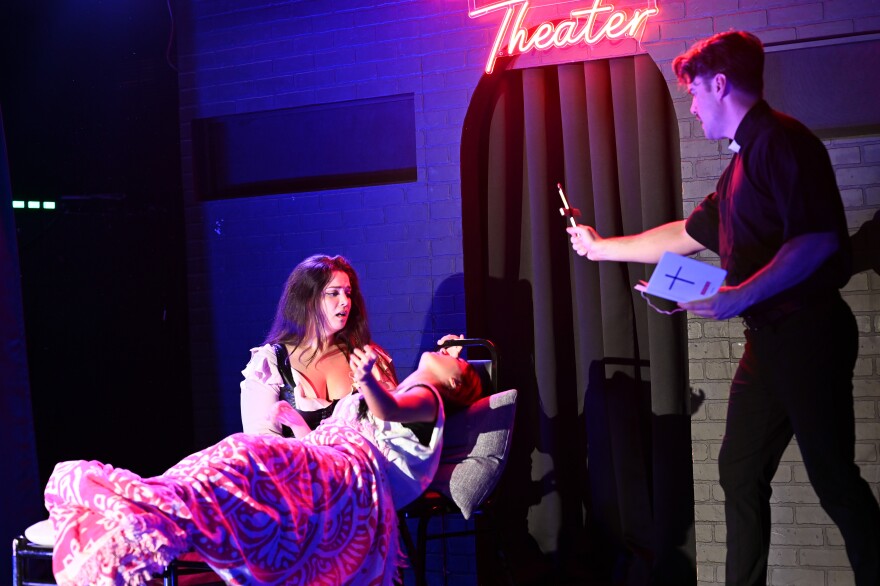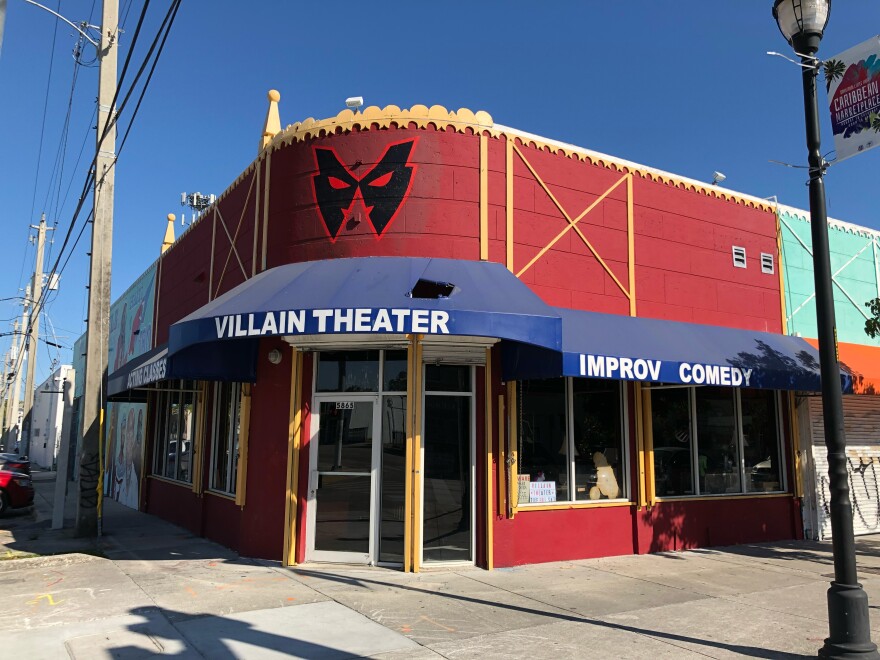Reaching a 10-year milestone in Miami is no joke.
In a transient city where longstanding businesses and organizations find themselves pushed out by rising costs, longevity can feel like the real luxury.
In the time that Villain Theater has been operating, the comedy club in Little Haiti has dealt with tenuous leases, limited resources and of course, a global pandemic. Now it’s marking a decade of making people laugh in South Florida.
READ MORE: Comedian Julio Torres takes a surreal spin on the American Dream in film 'Problemista'
“The idea was just to have fun with artistic people and the end product now 10 years later is a miracle,” said the theater’s co-owner and artistic director Peter Mir.
He and a friend started the comedy club in 2015 with a group of 10 students from Florida International University that wanted a place to refine their acting skills and practice their comedic chops. Mir takes pride in the theater’s commitment to a femme, queer brand of comedy that has garnered them a loyal following and tight knit community in South Florida.

“ We believe that there's enough people in Miami, despite the vast majority, that can appreciate alternative comedy and want to hear different voices. Even if it's weird or if it's something they didn't expect, they can find a home in our space,” Mir said.
Villain Theater hosts a bevy of programming which includes open mic nights and sketch, drag and improv comedy shows every week in addition to classes.
Jannelys Santos, who wears multiple hats as the theater’s chief operating officer, producer, actor and instructor, told WLRN she cherishes her work there.
“ That's the greatest joy that Villain has afforded me: just a sense of community. I think it was Claire Danes who said, ‘Theater is the remedy for loneliness,’ and that stuck with me enough,” Santos said. “I just can't be lonely when I have so many great friends here.”
WLRN spoke to Mir and Santos, who reflect on their humble beginnings 10 years ago. The conversation was edited for length and clarity.

WLRN: How did Villain theater get started?
MIR: I was working here locally in whatever theater productions I could do, and then, I decided with a partner of mine to start our own theater. It seemed we can combine our forces to figure that out — do some acting stuff, to do some improv. Then after just doing two months of classes, we're like, 'Let's do a show. That'll be fun.' It was so gigantic that we're like, 'We have to keep doing this.' I guess the propulsion of that one night — we're like, 'O.K., let's do it again next weekend and next weekend and the next weekend.' And we've never taken a Saturday off.
So what makes Villain Theater different from other comedy clubs?
SANTOS: What Villain provides is a very femme and queer space, and I think I'll say that with my full chest, because so few women get to be in these positions. And I genuinely think that I've inspired other women to be bold and to get on stage and to be womanly and not have to assimilate into male comedy tropes.
For people who aren't familiar with improv and sketch and drag, can you just explain a little bit about what people can expect at a Villain Theater show?
SANTOS: I think our style of improv is a little bit different. Since we have such a strong theater background and we really consider ourselves actors, it's a bit more theatrical in our performances. We really try to go into the emotion of it, the characterization of it within the shows. We mainly teach performance and emotional connection and the nature of the relationship between the characters and then sort of everything else falls in line.
RAMOS: What it sounds like is, it's not just a stage with that typical stool and a mic kind of situation.
MIR : Every once in a while we have guests from LA or Chicago or New York and they get to see what we do and it's further reminder of [how] we've grown so much. It's actually very much our own thing at this point. The amount of reps that we have is [what] performers in LA wish they had. It's so competitive out there. Here it's our playground. We get to do as much as we want. So it's mutated. It's — what do you call that, one of those evolutions — we're like the Galapagos Islands of comedy. We've gotten our own little weird creatures here that only exist here.
Do you find that comedians in South Florida evoke a specific sense of humor or approach to their material?
SANTOS: There is the tendency to either go full blown, ‘Oh, I'm Cuban' and sort of exaggerate your ethnicity to attract that sort of crowd. All of that is fantastic. But it does get kind of tiring to hear the same jokes over and over again. The other side of it is that if you do more, let's say, complex comedy — our audiences are less exposed to comedy, because there's just less comedy in Florida — they might not have the taste for it. But I think it's great to have a space where I can sort of push audiences to learn more and not give them what they could see somewhere else.
At a time when longstanding venues in South Florida have been dealing with high rent and limited resources, what do you think has contributed to the theater's longevity?
MIR: Everything's paid for with shows and classes, which keeps us very honest. But the real reason, the answer to the question to me is actually very simple. How do you keep the doors open? It's not us. It's the people supporting our shows, it’s our students.
We are a community and that's why we can exist anywhere. So I'm not worried about the next 10 years in the sense of, ‘Oh, where are we gonna be?’ It's O.K.. I have these amazing people that love to work together. We'll figure something out.
Keep up with South Florida's arts and culture scene by signing up for The A/C Newsletter. Every Wednesday, the A/C will offer a curation of stories and deep dives that celebrate South Florida's arts community. Click here to subscribe.






